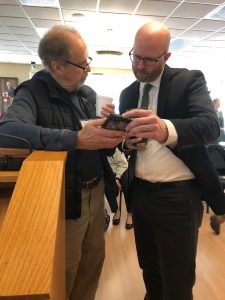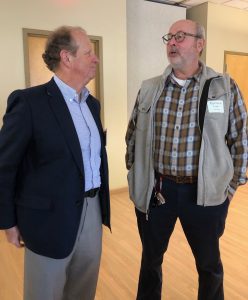GREENEVILLE – Biblical prophets hold strong views in their writings about justice and the proper way to treat workers, an Old Testament professor said in a Tusculum University lecture.

Dr. Jason Bembry, right, converses with a participant during a break in the Theologian-In-Residence presentation.
Dr. Jason Bembry, who teaches at Emmanuel Christian Seminary at Milligan College, finished Tusculum’s 2019 Theologian-In-Residence series with a presentation Wednesday, Feb. 26, titled “Advocating for Working People and Pursuing Justice.”
Dr. Bembry offered multiple verses from scripture in support of workers. They include Malachi 3:5, Jeremiah 22:13, Ezekiel 22:29, Deuteronomy 24:14-15, Exodus 20:10 and Leviticus 19:13.
“The Bible is aware of people who are day-to-day wage earners, and so you have this law that stipulates you cannot withhold wages from them, that you need to be sure to pay them on a daily basis so they can live every day,” Dr. Bembry said. “They’re really one paycheck away from poverty and starvation, and in the ancient world, that’s a big deal because there are not a lot of safety nets. The Bible stands out in many ways with scripture that looks out for these folks.”
People in recent history who exemplify the concern for workers are Dorothy Day, Myles Horton and César Chávez, Dr. Bembry said.
He talked about Day’s motivation to act after reading about the oppression of immigrant workers outlined in “The Jungle.” That was one reason she started “The Catholic Worker,” a newspaper that shared the concerns of working people. She received criticism from some people for her work and even had a run-in with Cardinal Francis Spellman for her coverage of striking Catholic gravediggers. She also reported on his efforts to break that group’s strike.
Dr. Bembry said Myles Horton helped organize striking coal miners, who were paid in scrip that was only redeemable at the company store. The National Guard arrested Horton. The strike was eventually broken and workers lost their jobs, but Horton was able to secure employment for them at the Tennessee Valley Authority.
As for Chávez, Dr. Bembry mentioned his leadership of the United Farm Workers during its strike against grape growers in California. That generated a lot of attention, including from then U.S. Sen. Bobby Kennedy. The local sheriff had arrested some people, and Kennedy pressed him about his rationale for that action only to learn that law enforcement’s actions did not comply with the U.S. Constitution. That was a major moment for the workers because it was the first time an elected official had publicly advocated for them, Dr. Bembry said.

Dr. Dan Donaldson, left, a member of the Tusculum University Board of Trustees, speaks with Robert White during a break in the Theologian-In-Residence presentation.
“We can use Dorothy Day, Myles Horton and César Chávez as models to help us think about how we, too, might get involved in making sure that working people all around us can be protected,” Dr. Bembry said.
He said problems for workers still exist.
“Human trafficking has enabled a sort of quasi slavery to come back into existence, so people are being smuggled into this country and other countries to work for almost nothing under the radar of any kind of government oversight or communal oversight,” Dr. Bembry said. “We also know of illegal immigrants being paid dirt-cheap wages because people can get away with it. The immigrants are not going to complain because if they do, they will be discovered to be illegal aliens. They have reason to shed no light on their plight.”
Switching topics, Dr. Bembry said a number of words in the Bible can be translated to justice, with the most common being the Hebrew word “mishpat.” He said that word appears in Isaiah 43 times, Jeremiah 31 times, Ezekiel 43 times, Amos four times, Hosea six times and Micah five times.
“The definition that I would encourage you to work with when the Bible talks about justice is simply what is right,” Dr. Bembry said. “It is often placed in poetic parallel. When Amos says, ‘Let justice roll down like a river and righteousness like an ever-flowing stream,’ he is putting them in parallel to show you that two words mean something similar.”
The person Dr. Bembry used as a prime example of justice in more modern times is Dr. Martin Luther King Jr. He also noted the work of Rosa Parks. Talking about Dr. King’s work, Dr. Bembry cited a line the civil rights icon wrote from a Birmingham jail: “An injustice anywhere is a threat to justice everywhere.”
Dr. Bembry also mentioned Dr. King’s support of the striking sanitation workers in Memphis, where he was killed.
“He is a titan of justice,” Dr. Bembry said. “When we look at his work, we see that he was bringing power and pressure to bear on things that just weren’t fair. Jim Crow laws weren’t fair. We still have things that are not fair to this day that we need to think through.”
Summarizing his four lectures, Dr. Bembry said he wanted the audience to understand that walking in the prophetic tradition entails a level of courage that requires people to stand against the tide of prevailing cultural norms.
“Our intent in this series has been to look at what the biblical prophets teach us about what it means to walk in a prophetic tradition,” Dr. Bembry said. “We have explored not only being a prophet in a biblical sense but also living that out today. That does not mean we are prophets, just that we can emulate the kinds of things that prophets were passionate about.”


